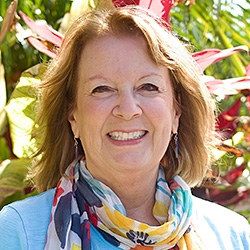
Search Results: socialization
-
The focus on patriarchy emerges from the understanding that patriarchy plays a foundational role in everything. Yes, I mean it: everything. Patriarchy is not the same as sexism; patriarchy is to sexism very much what structural racism is to (interpersonal) racism: it's a system that runs independently of any one person's attitudes or behaviors. Join Miki for her first in a series of discussions on patriarchy.
-

What will it take to reclaim our fundamental relatedness with all things alive, surrender our attempts to control nature, and find a way of living that averts or mitigates the worst possible catastrophes awaiting us while it's still possible?
-
When we don't like what someone is saying to us, sometimes people encourage us to hear their needs, and "not take it personally" -- and we're inclined to agree. Could "not taking it personally" close our hearts and awareness to others, life and ourselves? Rachelle Lamb invites us to take a closer look at what it's like when we attend to the situation from our hearts, and skillfully reflect upon our actions with tenderness.
-
Getting "feel good" empathy can become an addiction. Even to the point of seeing people who don't offer empathy as "not being NVC". Rachelle urges us to notice how this view of NVC can be seductive, and even dangerous. In this article, she explains how we can expand our compassionate awareness when we go beyond equating NVC with harmony and empathy. She asks us to become more open to noticing others' experiences even if it challenges our personal and collective belief systems -- and especially when it upsets us to consider it.
-
Working on social justice and racial equity? If you include attending to white culture and privilege as part of that work, you'll reap important benefits. Understanding white culture — along with its embedded historical privileges — provides valuable insight into a larger system of inequity.
-
When does identifying our or others' needs become a coping mechanism that hides the real problems that go unaddressed, and thereby reinforcing problems? This article zooms out to take a look at how dealing with our needs in the absence of the larger picture can inadvertertly support unhealthy ways of operating, rather than become a healthy solution. It asks us to see what could be hidden -- both on the personal and societal levels.
-
Want to increase diversity, plus improve group dynamics and group functioning? There are things you can do to make NVC settings more welcoming to people of color. Learn more about how to use NVC; attend to impact; help the community understand and demonstrate more awareness; factor in historical context; engage; create a more inclusive climate; and more!
-
We can choose our stories of interpretation, and how to respond. And while stories of self-sufficiency can (to a degree) give us more influence over our own lives, they don't erase oppression, war, nor climate change. When stories omit a lens that includes impacts of interdependence, oppression, and structural inequities, stories can also keep us disconnected and blocked from compassion for self and others -- and perpetuating an oppressive status quo. However, with this lens we can make greater compassion and collective liberation possible. Even as the outcome is unknown.
-
"All humans share the same needs" -- tragically, this idea can hide the reality that some people with less power in society have needs that go unmet to a greater extent, much longer, and with more dire consequences. Often, when the marginalized bring up experiences related to their membership in a certain group, their pain isn't acknowledged, and focus shifts to the listener's discomfort. The concept of universal human needs can be used to silence and minimize their pain. Read on for how to proceed.
-
It’s essential to give ourselves time to grapple with the complex feelings surrounding the brutality of state-sanctioned racism and violence. But if all we do is reflect and attend to our emotions we fail to show up, where and when it counts. So let's not perpetuate the violence by standing idly. Instead, here's ten things you can do to move into concrete action to address the continued, untenable, and horrific violence of racism. A list of resources is included.
-
Human health is connected to health of ecosystems and other societies. Our wellness and liberation is found in our interconnection, kinship, reverence for life, and solidarity. Solidarity erodes through narratives, practices and policies that separate us from each other -- and this impacts societal functioning. The breakdown creates conditions for pandemic, racism, police brutality, exploitation in untold numbers, and extinction. Read on for how all is connected.
-
Even in the pandemic the line between what’s essential for people and what is “essential” for fueling the economy, often gets confused. Capitalist market economies actively undermine attending to needs for the many and for life as a whole. Economic recovery is a mirage leading to continued collective oppression. This article explores possible ways to bring us closer to attending to our actual needs — and caring for self, others and life.
-
The pandemic has unsettled deep patterns of consumption. There’s a fear, and with it comes the mindset that is the heart of rampant consumption; habits which are essential to the market economy’s “economic recovery”. High consumption is also the most direct cause of environmental degradation. What do we need in order to significantly reduce consumption for our greater resilience and freedom, and to increase our planetary and human sustainability?
-
For many people, attempting to connect with others across differences can feel akin to walking through a minefield. With humility, tenderness, and courage, Roxy challenges your perspectives and encourages you to open your heart and mind. Roxy uses concrete examples and visual tools to illustrate complex concepts.
-
Join CNVC Certified Trainer Jerry Koch-Gonzalez, Greg Rouillard and Certified Dynamic Governance (Sociocracy) Consultant John Buck for this six-session course recording to learn how to transform your method of meeting facilitation. Many NVC organizations have begun using sociocratic tools, including circle meetings and decision making by consent, with satisfying results.
-
Although we are evolutionarily designed for collaborating with others when attending to our basic needs, the weight of the systems and cultural messages we have inherited interfere. Many of us are doubtful that collaboration is possible or effective, and most of us lack both the faith and the skills to live collaboratively, regardless of cultural imperatives. Miki helps us navigate this terrain.
-
Don’t know how to effectively work through differences with others in your organization? You are not alone… Like most of us, you simply lack the training and skills – and that’s what you’ll acquire listening to this course recording. Join Miki and learn specific tools and tips that work – for everyone!
-
In this course recording, you'll encounter new abilities and learn how to collaborate effectively from WITHIN a team. You'll be invited to build on interpersonal relationships, and branch out into the exciting challenges present when people work together toward a shared purpose.
-
Transforming organizational culture requires attention and change at the systemic level. Learn which systems are crucial for any organization to establish and clarify whether that organization is collaborative or not, and then learn how to create and strengthen a collaborative organization.
-
Even in the face of societal upheavals we can look for what's in our power to change. For example, we can participate in systemic change, and heal whatever we need to heal that which keeps us from living our values more readily. We can take the time to be present to those in pain, and to show up fully in our lives even when we feel stress. We can take strides to make a difference towards creating the world we want to live in.

















